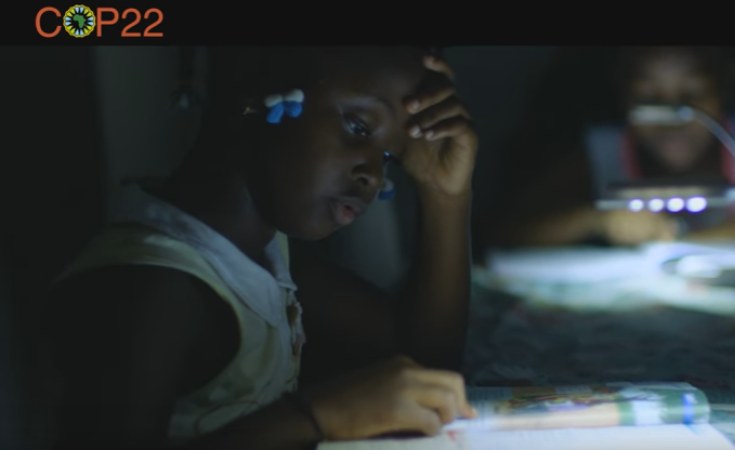At the UN's global climate conference this week, governments and development partners came together to examine the role of financing in shaping some of Africa's groundbreaking renewables successes such as Morocco's Noor Concentrated Solar Power (CSP) plant.
In an event co-hosted by the African Development Bank (AfDB) and the Climate Investment Funds (CIF), participants considered how the growing explosion in renewables in some African countries is being built on strategic partnerships between public and private sources of financing. Renewable energy has been identified as a key driver for Africa's economic growth prospects, but requires multi-million dollar investments which cannot be provided by public financing alone. Crucial public sector funding partners like the AfDB, CIF, World Bank, and major donor countries such as Germany are helping African countries find ways to break down barriers to private investment for vital renewables industries, and examples of success are beginning to emerge.
Mustapha Bakkoury, President of the Moroccan Agency for Solar Energy (MASEN), laid out Morocco's use of public and private investment to shape its renewable energy revolution, citing the Noor CSP plant as a linchpin of the country's far-reaching national plan. "Africa has legitimate energy needs, and development of Africa will happen through mobilization of its energy resources," said Bakkoury. "We believe that there is no conflict between having energy resources and respect towards the environment, and Africa has abundant resources to do this, particularly with support from its key partners."
Bakkoury said partners like the AfDB were instrumental in the solar energy development that has seen Morocco put up a massive solar energy plant in Noor Ouarzazate, the first of its kind in Africa and a model for African countries to follow.
In affirming AfDB's continued commitment to universal access to energy for Africa, Alex Rugamba, AfDB Director for Energy, Environment and Climate Change, said, "the Bank's commitment has shifted gears, and it now has a fully-fledged vice presidency dedicated to Power, Energy, Climate and Green Growth." Rugamba added that the Bank has learned valuable lessons from various initiatives it is already supporting, and knows what is required to move forward with the initiatives with fewer barriers to effective investment.
CIF Head Mafalda Duarte, who co-hosted and moderated the event, noted the critical role that public sector climate finance has played in Africa. "The CIF is working very actively in Africa to support over 20 countries as they undertake energy transformation," she stated. With implementing partners such as the AfDB and World Bank Group, the CIF has been the largest source of concessional climate finance to Africa, providing a third of its $8.3 billion financing -- $2.7 billion--to the region. In addition to public climate finance, the role of private investment is critical. Laura Tuck, World Bank Vice President for Sustainable Development, emphasized that private sector involvement is required to drive Africa's new energy agenda. "Private sector engagement cannot be ignored because the money they have is more than what is available under public financing," said Tuck.
But according to Thomas Silberhorn, Germany's Parliamentary State Secretary, Africa's renewables sector is a relatively new investment portfolio with many uncertainties, and the risk is believed to be very high for private investors to off-load their money.
"It's not about economic risks alone, but also political risks," said Silberhorn. "You don't need to convince German investors about solar energy because they already know that it works. What they need is a reliable political environment and confidence in the sustainability of their investments." Silberhorn added that ways to reduce political risks should be devised for Africa to benefit from private sector investments in renewables.
Nevertheless, the World Bank's Vice President Tuck believes there is hope for Africa, citing Zambia where record cheap solar energy has been recorded. "Through a competitive bidding process, in Zambia under the Bank's 'Scaling Solar' program we have recorded the cheapest price at 6.02 cents per KWh," she said, heralding it as a model for de-risking climate investments in renewable energy.
But in keeping with the objective of universal energy for all, experts note the need to ensure that the end users are not exploited at the expense of investors.
"While the state should not interfere in this business model to work, modalities have to be put in place to ensure that the people for which energy is needed can afford it; otherwise, the project becomes useless," said Bakkoury.
Following up on this key aspect and responding to the political risk question, Simon Ngure KenGen Director, Regulatory & Corporate Affairs, proposed involvement of local communities as a key principle to minimize political interference.
Renewables project sustainability is also connected to community buy-in. "If you involve the local communities from the onset, regardless of whether governments change, the projects succeed because the people will have seen the benefits already," said Ngure, who also noted policy restructuring as another key component to de-risking climate investments.


